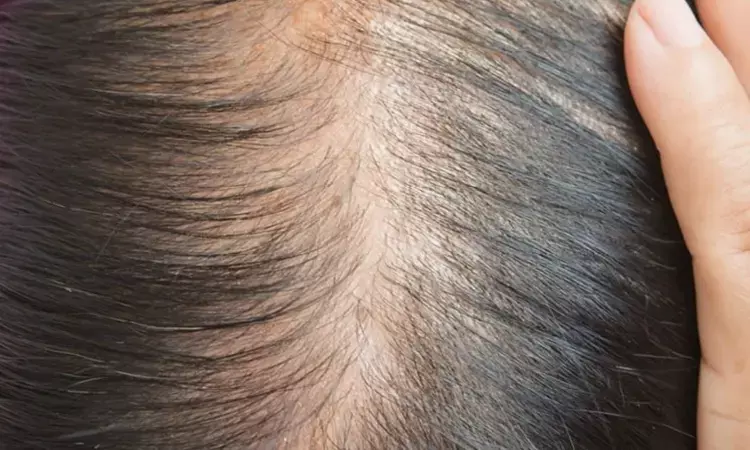- Home
- Medical news & Guidelines
- Anesthesiology
- Cardiology and CTVS
- Critical Care
- Dentistry
- Dermatology
- Diabetes and Endocrinology
- ENT
- Gastroenterology
- Medicine
- Nephrology
- Neurology
- Obstretics-Gynaecology
- Oncology
- Ophthalmology
- Orthopaedics
- Pediatrics-Neonatology
- Psychiatry
- Pulmonology
- Radiology
- Surgery
- Urology
- Laboratory Medicine
- Diet
- Nursing
- Paramedical
- Physiotherapy
- Health news
- Fact Check
- Bone Health Fact Check
- Brain Health Fact Check
- Cancer Related Fact Check
- Child Care Fact Check
- Dental and oral health fact check
- Diabetes and metabolic health fact check
- Diet and Nutrition Fact Check
- Eye and ENT Care Fact Check
- Fitness fact check
- Gut health fact check
- Heart health fact check
- Kidney health fact check
- Medical education fact check
- Men's health fact check
- Respiratory fact check
- Skin and hair care fact check
- Vaccine and Immunization fact check
- Women's health fact check
- AYUSH
- State News
- Andaman and Nicobar Islands
- Andhra Pradesh
- Arunachal Pradesh
- Assam
- Bihar
- Chandigarh
- Chattisgarh
- Dadra and Nagar Haveli
- Daman and Diu
- Delhi
- Goa
- Gujarat
- Haryana
- Himachal Pradesh
- Jammu & Kashmir
- Jharkhand
- Karnataka
- Kerala
- Ladakh
- Lakshadweep
- Madhya Pradesh
- Maharashtra
- Manipur
- Meghalaya
- Mizoram
- Nagaland
- Odisha
- Puducherry
- Punjab
- Rajasthan
- Sikkim
- Tamil Nadu
- Telangana
- Tripura
- Uttar Pradesh
- Uttrakhand
- West Bengal
- Medical Education
- Industry
Rare Case of Dermal Filler-Induced Hair Loss, Highlights Importance of Early Intervention

Saudi Arabia: A recent case report and literature review published in the Journal of Cosmetic Dermatology highlight a rare but concerning complication of dermal filler injections: filler-induced alopecia. While dermal fillers are widely used in aesthetic medicine to enhance facial features and reduce signs of aging, complications like hair loss at the injection site are infrequent, but require serious consideration among practitioners.
"Although filler-induced alopecia is rare, it requires increased awareness among dermatologists and aesthetic practitioners. By following proper injection techniques and dosages, and using ultrasound guidance when appropriate, the risk of this complication can be minimized, enhancing patient safety," the researchers wrote.
Filler-induced alopecia occurs when the injection of dermal filler material into the skin inadvertently causes hair loss, typically in areas where the filler is injected, such as around the eyebrows or temples. This condition can be distressing for patients, particularly as hair loss can have a significant impact on appearance and self-esteem. While the exact mechanisms behind this complication are still being studied, the literature suggests that the inflammatory response triggered by the filler material may disrupt hair follicles, leading to temporary or even permanent alopecia in some cases.
Khalid Nabil Nagshabandi, Department of Dermatology, College of Medicine, King Saud University, Riyadh, Saudi Arabia, and colleagues aimed to shed light on the clinical presentation, diagnostic approach, and multidisciplinary management of filler-induced alopecia, the study contributes to the existing literature by providing a comprehensive review of previously reported cases.
The case concerns a 21-year-old female who presented with localized skin necrosis and alopecia four days after receiving 7 mL of hyaluronic acid (HA) filler injections in the temples, tear troughs, and eyebrow glabella regions. Trichoscopy revealed follicular dropout and white dots, indicative of ischemic hair loss. Treatment consisted of 1500 units of hyaluronidase injections, intralesional corticosteroids, topical minoxidil, and CO2 laser therapy. After one year of follow-up, the patient experienced complete hair regrowth and resolution of facial scarring.
The researchers note that only 16 cases of filler-induced alopecia have been documented, with the majority involving hyaluronic acid (HA) fillers. The case highlights the critical importance of early recognition and timely intervention with hyaluronidase to prevent ischemic damage. The multidisciplinary approach used in this instance demonstrates the potential for complete cosmetic recovery.
"Filler-induced ischemic alopecia and skin necrosis are uncommon but significant complications. Ongoing vigilance and heightened awareness among dermatologists and cosmetic practitioners are essential to reducing the risk of permanent alopecia in patients undergoing filler procedures," the researchers wrote.
"Early identification, coupled with a multidisciplinary treatment approach—such as hyaluronidase, corticosteroid injections, and topical or oral minoxidil—can lead to successful management, including hair regrowth and cosmetic skin recovery," they concluded.
Reference:
Albargawi, S., Nagshabandi, K. N., & Shadid, A. Dermal Filler-Induced Alopecia: A Case Report and Literature Review. Journal of Cosmetic Dermatology, e16684. https://doi.org/10.1111/jocd.16684
Dr Kamal Kant Kohli-MBBS, DTCD- a chest specialist with more than 30 years of practice and a flair for writing clinical articles, Dr Kamal Kant Kohli joined Medical Dialogues as a Chief Editor of Medical News. Besides writing articles, as an editor, he proofreads and verifies all the medical content published on Medical Dialogues including those coming from journals, studies,medical conferences,guidelines etc. Email: drkohli@medicaldialogues.in. Contact no. 011-43720751


